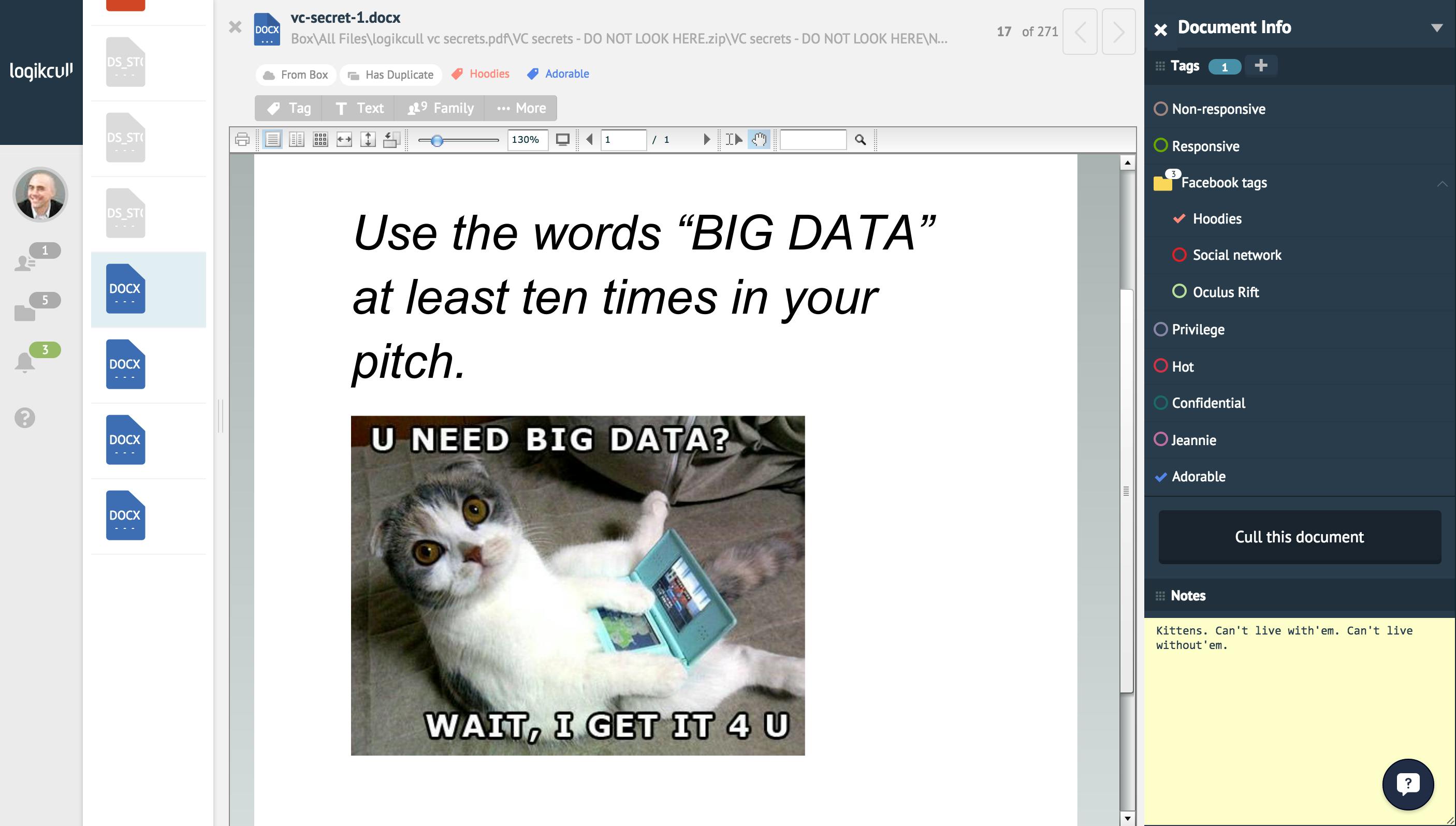Given that lawyers earn hefty hourly fees, they’re hardly incentivized to work efficiently. Their billable hours to clients can get absurd quickly, and this is especially apparent when it comes to a part of the judicial process called “discovery“—combing through oodles of documents in order to find the few bits and pieces that are actually relevant to a given case.
A big data company called Logikcull aims to turn this paradigm on its head. Its software effectively automates judicial discovery with help from machine learning algorithms that query overwhelming gobs of data to cull together (get it?) the few pertinent kernels of information relevant to a case.
In short, by separating legal signal from noise, the company’s software makes it easier for everyone to afford the same access to due process. On top of that, it works for public requests for government documents, too, helping to build far greater transparency into the halls of power.
Andy Wilson, CEO and cofounder of Logikcull, laid out an analogy for us over the phone about how his company’s software looks for data the way people might shop for televisions online: “Amazon has pretty much every TV for sale out there. If you’re shopping for a TV, you don’t look at all of them. You set parameters: ‘Give me TVs in this price range that are this size,’ and so on. But a lawyer would look at every single TV to make sure he or she didn’t miss an important one. To go through that much information means that 70-90 percent of the cost of litigation is in discovery.”
This conventional legal approach here is one that Wilson and his cofounder, Sheng Yang, find unacceptable. So they found a way to take most of the time and money out of the process.
To finding the proverbial needle in the haystack, Logikcull’s customers upload gigabytes and gigabytes of data—emails, ZIP files, PDFs, anything—and the company’s servers get to work processing it, untying the knots to make the data more human-friendly. Documents are categorized, duplicates are linked—the software sorts everything far more quickly and efficiently than a lawyer taking his or her time to go over everything at a comfortable, wallet-lining pace.
Logikcull’s primary customers are law firms engaged in discovery and government departments that need a way to more rapidly fulfill Freedom of Information Act (FOIA) requests. Wilson says his company has reduced costs for these entities from “millions to thousands.”
“What used to take months now takes days or hours. It’s just software,” he said.
Logikcull’s FOIA capabilities are no different from its discovery functionality. Wilson shared how his company was able to dramatically transform how these requests are fulfilled.
“In the past, it was no big deal. You’d walk down to a filing cabinet, open a drawer, photocopy everything, and ship it off. Nowadays everything’s in an email, a Dropbox, everywhere. There’s a mountain of info and it’s increasingly complex. On average, it will take them two weeks to respond to a FOIA involving email. It’s not because they’re twiddling their thumbs; it’s because they’re reading every single document one by one, printing them to paper, redacting certain parts, and scanning them back in. They lack the tools to do modern discovery of information. It takes about 50 minutes for Logikcull to do the same thing.”
The company built its own data center to facilitate this high-level functionality. Its customers are perpetually uploading data to its servers for processing. (Wilson said that every 15 minutes or so, customers upload 10-20 GB of data). “Our index is really rich,” he said. “We mine the shit out of this data. If it needs OCR [optical character recognition], it’s gonna get OCR. If there are documents hidden within other documents, we find them. If you’re going through this by hand, there’s a good chance you’ll never know that info exists—there’s too much complexity.”
Logikcull’s customers are generally a low-tech collection folks. They’re attorneys, paralegals, and government bureaucrats who can’t be bothered to learn how to use advanced software, so this company has invested the time necessary to create an elegant drag-and-drop interface to make it a snap to use.
The company operates on a subscription basis, starting at $1,500 per month—too much for average Joes, but a bargain for organizations that spend far more in manpower on the same tasks. At that rate, customers can upload up to four “matters” per month at 50 GB per matter.
Photo via Andy Wilson





